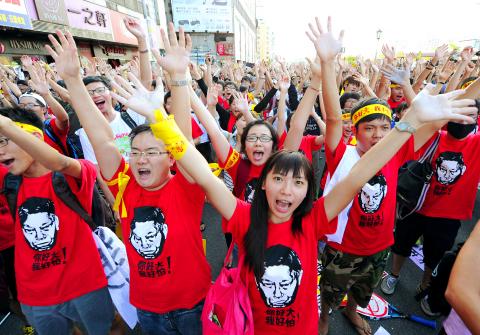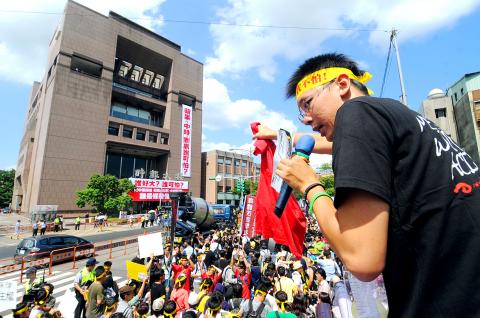Thousands of journalists, students, academics and social activists yesterday took to the streets in Taipei to protest against monopolization of the media and demanded that the National Communications Commission (NCC) help break monopolization of the media.
“No to monopolization of the media, protect professionalism in media,” thousands chanted as they marched from Want Want China Times Group (旺旺中時集團) headquarters to the NCC headquarters in Taipei.
Many of the demonstrators held home-made signs and placards with slogans against media monopolization or the Want Want China Times Group, such as “You’re big, but I’m not scared,” “I would like my news without additives” and “Non-professional media operators should go back to making biscuits.”

Photo: CNA
One woman taking part in the march wore a mask that looked like two hands covering her eyes and held a sign reading: “Media monopoly blinds my eyes.”
“We are gathered here because we are upset that [Want Want China Times Media Group chairman] Tsai Eng-ming (蔡衍明) used media outlets under the group as his own personal tool to attack his enemies. We’re also worried that when the group gets its hands on the largest cable TV service provider, it will be a disaster for the country,” Association of Taiwan Journalists (ATJ) chairwoman Chen Hsiao-yi (陳曉宜) told the crowd.
The ATJ, along with the Campaign for Media Reform, Taiwan Media Watch, the Alliance against Media Monsters and the Youth Alliance against Media the demonstration.

Photo: Lo Pei-der, Taipei Times
“We are here to demand our freedoms of expression and of media,” Chen said. “We call on Tsai to give up his merger plan with China Network Systems (CNS, 中嘉網路).”
Chen was referring to a Want Want plan to acquire some of the cable TV services owned by CNS, the largest cable TV service provider in the country, that was conditionally approved by the NCC last month.
The merger plan has worried many because the Want Want China Times Group already owns several media outlets, including newspapers, a magazine, TV channels and a radio station. Opponents worry that if Want Want buys CNS’ cable TV services, it may be able to interfere with other media outlets, with the power to decide which channels may be broadcast via cable.
The issue did not attract too much public attention until last month, when all media outlets under the group launched a series of reports accusing the Academia Sinica research fellow — who is a strong opponent to the merger case — of paying students to join anti-merger rallies, which was later proved to be false.
When one National Tsinghua University student, Chen Wei-ting (陳為廷), questioned Want Want’s motives, he also became a target of criticism by media outlets under the group.
“CtiTV [of the Want Want China Times Media Group] aired news reports criticizing me 24 hours a day during that time, and each news report could take as long as 15 minutes of air time,” Chen Wei-ting said. “This shows how horrible things could get when a media group has a monopoly.”
Some foreign students also joined the march.
Chong Yee-shan (張玉珊), from Malaysia, said she joined because media monopoly is also a serious problem in her own country, especially in Chinese-language media outlets.
Several human rights groups, such as the Taiwan Association for Human Rights, the Deng Liberty Foundation, Taiwan Students for a Free Tibet, Taiwan Labor Front (TLF) and the Humanistic Education Foundation, participated.
“The media issue is important for social groups, especially those who are working for the rights of the disadvantaged in our society,” TLF secretary-general Son Yu-lian (孫友聯) said. “When all media outlets are in hands of big corporations, disadvantaged people will be silenced.”
Journalism students were among the most predominant groups in the march.
“I want to become a journalist when I finish school, so I am concerned about the work conditions for journalists,” said Kuo Chih-jung (郭芝榕), a student at National Taiwan University’s Graduate Institute of Journalism. “I would like to call on the government to help maintain the independence of media outlets.”
Another journalism student surnamed Lee (李) said she was concerned about how the awareness and energy of the demonstration could be maintained, so that real reform of the media could succeed.
The parade ended in front of the NCC headquarters, as the crowd called on the institution to make or revise laws to help maintain the independence of media outlets, which an NCC official who accepted a petition from ATJ head Chen Hsia-yi promised to help out.
In response, Want Want China Times Group published a full-page advertisement in the China Times yesterday asking: “Who is big? Who is scared?”
“Our news reporting has been always professional and can be scrutinized. We welcome all criticism,” the advert said.
Additional reporting by CNA

Tropical Storm Gaemi strengthened into a typhoon at 2pm yesterday, and could make landfall in Yilan County tomorrow, the Central Weather Administration (CWA) said yesterday. The agency was scheduled to issue a sea warning at 11:30pm yesterday, and could issue a land warning later today. Gaemi was moving north-northwest at 4kph, carrying maximum sustained winds near its center of up to 118.8kph and gusts of 154.8kph. The circumference is forecast to reach eastern Taiwan tomorrow morning, with the center making landfall in Yilan County later that night before departing from the north coast, CWA weather forecaster Kuan Shin-ping (官欣平) said yesterday. Uncertainty remains and

SEA WARNING LIKELY: The storm, named Gaemi, could become a moderate typhoon on Wednesday or Thursday, with the Taipei City Government preparing for flooding A tropical depression east of the Philippines developed into a tropical storm named Gaemi at 2pm yesterday, and was moving toward eastern Taiwan, the Central Weather Administration (CWA) said. Gaemi could begin to affect Taiwan proper on Tuesday, lasting until Friday, and could develop into a moderate typhoon on Wednesday or Thursday, it said. A sea warning for Gaemi could be issued as early as Tuesday morning, it added. Gaemi, the third tropical storm in the Pacific Ocean this typhoon season, is projected to begin moving northwest today, and be closest to Taiwan on Wednesday or Thursday, the agency said. Today, there would likely

DISRUPTIONS: The high-speed rail is to operate as normal, while several airlines either canceled flights or announced early departures or late arrivals Schools and offices in 15 cities and counties are to be closed today due to Typhoon Gaemi, local governments announced last night. The 15 are: Taipei, New Taipei City, Taoyuan, Tainan, Keelung, Hsinchu and Kaohsiung, as well as Yilan, Hualien, Hsinchu, Miaoli, Chiayi, Pingtung, Penghu and Lienchiang counties. People should brace for torrential rainfall brought by the storm, with its center forecast to make landfall on the east coast between tonight and tomorrow morning, the Central Weather Administration (CWA) said. The agency issued a sea warning for the typhoon at 11:30pm on Monday, followed by a land warning at 11:30am yesterday. As of

CASUALTY: A 70-year-old woman was killed by a falling tree in Kaohsiung as the premier warned all government agencies to remain on high alert for the next 24 hours Schools and offices nationwide are to be closed for a second day today as Typhoon Gaemi crosses over the nation, bringing torrential rain and whipping winds. Gaemi was forecast to make landfall late last night. From Tuesday night, its outer band brought substantial rainfall and strong winds to the nation. As of 6:15pm last night, the typhoon’s center was 20km southeast of Hualien County, Central Weather Administration (CWA) data showed. It was moving at 19kph and had a radius of 250km. As of 3pm yesterday, one woman had died, while 58 people were injured, the Central Emergency Operation Center said. The 70-year-old